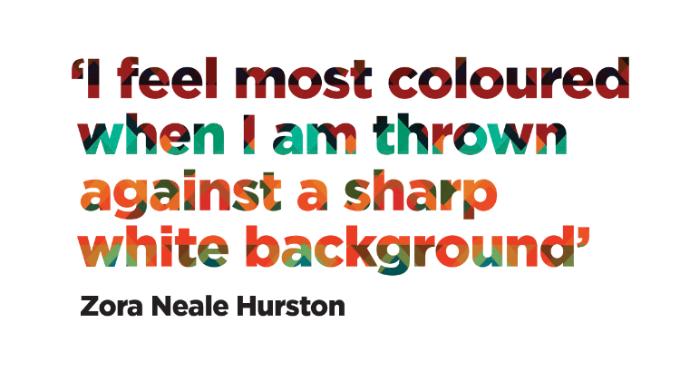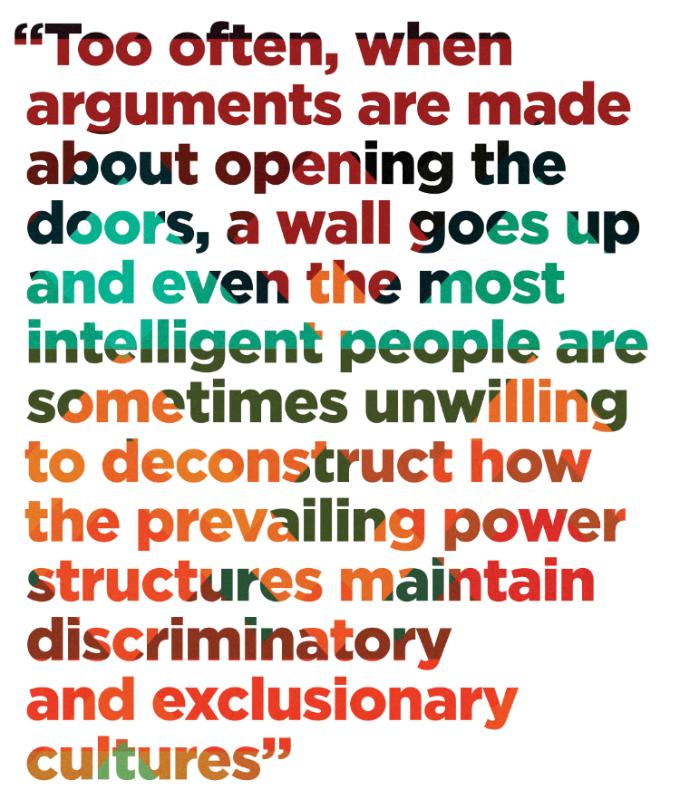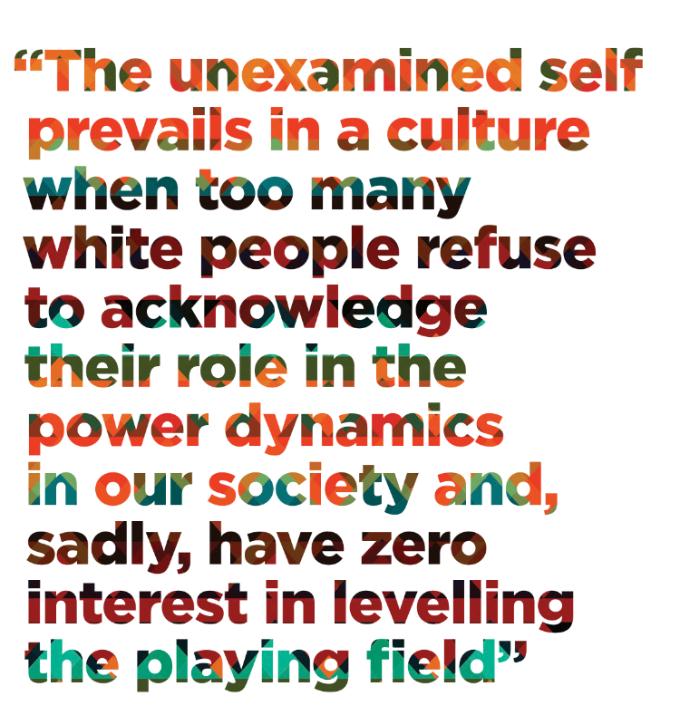Why we need to embrace the concept of Whiteness
11 min read
Bernardine Evaristo’s mother is white and her father is Black. Yet she moves through the world as Black and biracial, never as white. The award-winning author explores identity, privilege, the reality of racism, and what it means to be part of the white majority in Britain
This essay is my attempt to deconstruct why we need to embrace whiteness as a term in our racialised society. I’ve lived my whole life in the UK, growing up before the Race Relations Act of 1976, when racism was finally made illegal, through the changing decades, until we arrived at the Black Lives Matter movement. Since I was born Black people have been labelled Negro, coloured and now Black, while the term ‘people of colour’ has gained currency of late because of its inclusiveness. I like it for this reason.
The designations of Black, white and ‘people of colour’ are symbolic racial classifications rather than literal, of course, because nobody has white or Black skin and we are all on the colour spectrum. As for BAME or BME, these terms are currently endangered species as acronyms for a number of reasons, not least because they conflate too many identities under their banner, to the detriment of some. White as a colour is one historically associated with a purist concept of Britain’s hereditary lineage propagated by some sections of society who have a white filter on Britain’s history and identity. Yet Britain’s foundations are a multi-lingual, multicultural, crosspollination of demographics, which continue through to this day.

I am bi-racial, equally derived from my Black Nigerian father and white English mother. Half one, half the other, previously called half-caste. Which half is what, you might ask? Right? Left? Top? Bottom? Megan in my novel Girl, Woman, Other is described as this: “Megan was part Ethiopian, part African-American, part Malawian, and part English, which felt weird when you broke it down like that because essentially, she was just a complete human being.”
Ah, if only it were that simple, for us to be complete human beings, to respect each other’s humanity regardless of visual appearance, to live as equals. We wouldn’t then need these racial classifications with all the injustices, stereotypes, power imbalances and dramas swirling around them. It’s actually very strange to write about whiteness rather than Blackness or brownness, yet they exist in relation to each other with the former foregrounded in debates around race, and the latter rarely acknowledged, let alone discussed outside of ‘Whiteness Studies’ which emerged in American academia in the Nineties. In biological terms, there is only one race – the human one. However, we also have to accept that race is a lived reality and that our visual appearance is an indicator of both ancestral and cultural backgrounds, and suggestive of how we are perceived and treated in Britain, a majority white country. The minority-majority equation is all about perspective and context because while Black and Asian people are part of the global majority and are increasingly referred to as this, we are still minoritised in Britain. What does it mean, therefore, to be born and raised in this country, to be thoroughly inculcated into its culture as citizens, to claim it as your own, yet to be perceived as different, to be discriminated against, because the colour of your skin does not match that of the white majority.
Whiteness has long represented goodness, purity, innocence, beauty, cleanliness, and all things holy. Conversely, Blackness as a colour has been entrenched in the popular imagination for centuries as negative, bad, dangerous and ugly. There is still, unfortunately, a similar correlation with Black people in the public consciousness. The etymology of the English language evolved long before the advent of racism emerged as an ideology designed to diminish the humanity of Africans in order to justify the slave trade, and while no-one is actually Black or white, at some time in our history these terms, already loaded with meaning, were applied as racial categorisations. I mean, why not beige and brown people instead? Surely that would be more accurate? Or pink-ish and brown?
While I identify as both Black and bi-racial, not in a million years would I be able to identify as white. Well, I could give it a go, I guess. Let’s say I wake up one morning having had an epiphany that I’m actually white and, just as I claimed my Black identity in my late teens, I will now claim my white one. “Time for a change, folks’”, I’ll tell everyone, “because guess what, I’ve decided to be white from now on.”

Yes, I’m white because my mother is, and her ancestors were, the very ones whose lineage I can trace back to the early eighteenth century in these here lands. So, it is my right to henceforth self-define as white. I can tick the white box on forms, for a start. I will tell every white person I come across that actually, I’m white, you know, the same as you. I’ll have to get this in, however, before you pre-judge me; before you move your handbag closer to you in a cafe when I sit next to you; before you talk over me in a meeting; before you treat me with less respect; before you pull me out of the queue at departures at British airports for a ‘random’ search of my already x-rayed bag; before you exclude me from your white gatherings. “None of this will apply anymore,” I’ll say, while smiling, whitely, “because I’m white, just like you.”
I’ll also have to tell my Black brothers and sisters that I’m no longer one of them, but white. No, not ‘trans-racial’ but merely switching sides in the identity game of being bi-racial.
So, how long do you reckon before I’m carted off and incarcerated?
Theoretically, I should be able to assume the identity of either of my parents, but it doesn’t work like that. I look Black, admittedly lighter-skinned Black, but still Black, and that means that I am the embodiment of people’s perceptions of Blackness. If whiteness isn’t a thing, then I can identify as white.
Racism is a disease that casts a shadow over this country, even though – rather like coronavirus-deniers – there are nutters out there who believe it’s not real, that it exists only in the imagination of people who want to blame others for their lack of get-up-and-go and that it’s the preserve of rabble-rousers who just want any old excuse to attack the establishment, the status quo. Those who deny the reality of racism are deluding themselves and aren’t listening to the evidence of how it is manifested. There are also those white people who accept that racism exists but see it as something removed from themselves, as something perpetrated by racist thugs on the street, and not embedded in our social and institutional structures that are laden with layers of prejudice and preferentiality according to race, gender, class, disability. Then there are those who don’t see it as their responsibility to help exorcise racism as a malevolent force in our society. They don’t take it on as a personal or organisational objective because they consider it to be the responsibility of people of colour. We are seen as having a problem that we have to solve, rather than being the recipients of a problem imposed on us by others.
So what is this thing called whiteness and why do so many white people feel affronted at being thus categorised, complaining that they are individuals and not racist. Well, to be white isn’t synonymous with being racist and one doesn’t lose one’s individuality when assigned a social group or particular demographic. You can be white, non-racist and your own unique and sweet self. You can also be white and racist, and let’s not forget that racism materialises in multiple ways, from the white woman crossing the road when a Black man walks towards her (because every one of the hundreds of millions of Black men in the world are muggers, rapists and murderers – a myth perpetuated by the 1970s media which persists), through to the proud white supremacists who have their far-right politics tattooed onto their shaven heads.
Whiteness is the default in Britain, and it is associated by some with an essentialist notion of Britishness. To be white is normal here and this affects, in infinite ways, those who are not, in spite of the fact that we might be British born and raised. The legendary African-American novelist, Zora Neale Hurston (1891-1960) once wrote, “I feel most coloured when I am thrown against a sharp white background.” This is indeed the reality for some of us some of the time. To be Black is to stand out in ways that white people often don’t realise. When a white friend of mine went to Nigeria for the first time she returned complaining at how much she stood out, how alien she felt. Welcome to my world, I told her. Of course, many of Britain’s major cities are multi-racial. I live in London but even so there are many spaces in the capital city where whiteness prevails such as in the upper echelons of academia, at the top end of business and in the boardroom, at every level of the media, and those who hold sway in the arts. Too often, when arguments are made about opening the doors, a wall goes up and even the most intelligent people are sometimes unwilling to deconstruct how the prevailing power structures maintain discriminatory and exclusionary cultures.

The notion of white privilege is a tricky one and is arguably counterproductive as an argument when it engenders such defensiveness. Look at the arrogant and dismissive responses in Parliament to the much milder suggestion of unconscious bias training recently. The research around unconscious bias is compelling: people gravitate towards those most like them, influencing, for example, their hiring and promotion practices. In a white dominated society people of colour are adversely affected by this. Yet the unexamined self prevails in a culture when too many white people refuse to acknowledge their role in the power dynamics in our society and, sadly, have zero interest in levelling the playing field.
There are many kinds of privilege that play out and affect how easily we move through our society – and whiteness, in some contexts, is one of them. For Black people, race might be the biggest barrier we face, but others have different experiences of disadvantage. Denial of the collective clout of whiteness and the existence of systemic racism in Britain is one of the biggest challenges we face when eradicating it.
I have an interesting, multi-racial history of relationships. When I met my white husband, I’d spent about 15 years mostly dating Black men. I was struck by how he was able to move around this country with the ease of a white man who is not seen as other. The only assumptions made of him were positive, that he was a middle-class white man who deserved to be treated with respect. He was naturally surprised when I pointed this out to him.
My husband doesn’t live every day of his life with negative assumptions borne out of centuries of racist indoctrination; he doesn’t have to wear the emotional armour necessary to survive as a Black man in a white society where, for example you might recall, you might have two middle-aged Black men in a car, a Member of Parliament and a magistrate, and they are still targeted by racist, armed policemen who surround their car on the grounds that they have dark skin and are therefore criminal (like the hundreds of millions of other Black men in the world etc). This is what happened to the Rt Hon David Lammy MP and his brother.
We all need to be part of the conversations around racism that deepen our understanding of different positions, experiences and perspectives, but without accusations and defensiveness, guilt-tripping or self-pity. We need to find a language that enrols everyone, including white people, in the possibility of leading an actively anti-racist life as we work towards creating a more egalitarian society.
Bernardine Evaristo won the Booker Prize 2019 with her eighth book, Girl, Woman, Other, the first black woman and black British person to win it. She is Professor of Creative Writing at Brunel University London and Vice Chair of the Royal Society of Literature. www.bevaristo.com
